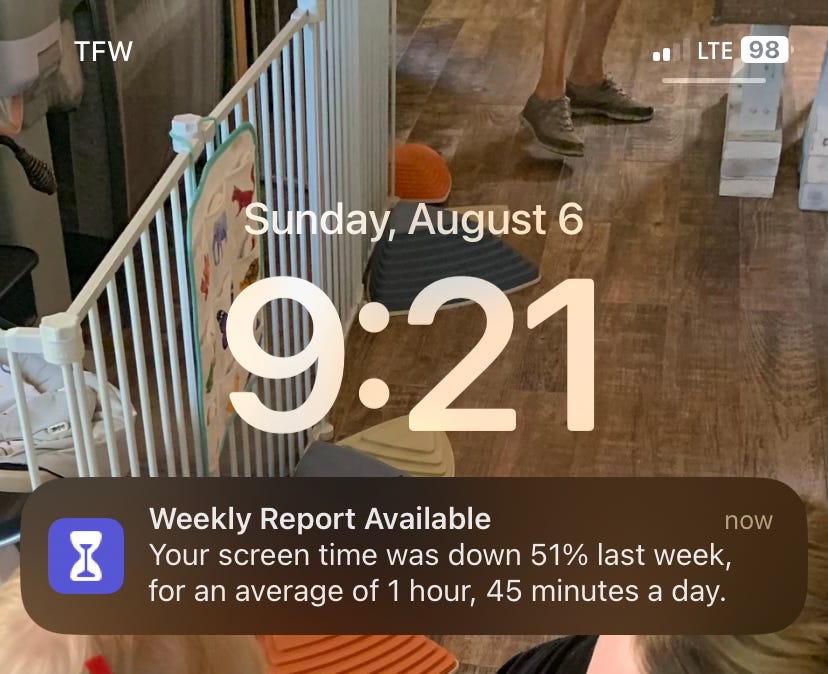Hello there! Welcome to this week’s installment of my digital detox reflections. If you are a new reader of The Endeavor I will direct you here, or here for a quick look at my current weekly digital detox habits and for a sense of what these reflections are all about.
A quick update: I have changed my routine slightly. I decided to make every Tuesday the day of the week when I commute and work in complete silence instead of Wednesday. This adjustment was made to give me more time to write these reflections. These are generally short, but I only have 30 minutes a day to write so every bit of extra time helps. I realize this is trivial and maybe not worth mentioning but I am attempting to be completely transparent which means sharing even minor details.
Progress Report: I am happy to share that after last week’s post, I deleted the Amazon App and Vocabulary App from my phone. I now have two fewer reasons to look at it!
I was also able to slash my screen time by 51%. Only 1 hour and 45 minutes a day. This honestly still feels like too much but I realize it’s well below average. So that’s encouraging. If any of you have any progress to report, comments or questions, feel free to share!
Where my thoughts have been
This week, during my detox sessions, I was stuck on the subject of limitation. I remember listening to Jordan Peterson on a podcast where he talked through an idea about God. He said it was an old Jewish idea. I’m just going to take his word on that. If you know differently, feel free to share. Anyway, he posed the idea in the form of a question. The question is; What does God lack? My immediate reaction was, nothing…. He’s God. But that was not the answer. The answer was, God lacks limitation. Limitation was was then put forth as a justification for creating limited beings, such as ourselves. He lost me there because God does not have to justify why He does anything. He’s God. But still….this idea of God lacking limitation has stuck with me ever since I heard it, and was on my mind this week.
It’s been pointed out by people far smarter than me that our problems with sin come from our desire to become limitless, which is to become like God. Our initial rebellion was the playing out of our attempts to defy these limitations. We were deceived into thinking the limitations placed on us by God were somehow oppressive. The explicit lie was that “ye shall not surely die: For God doth know that in the day ye eat thereof, then your eyes shall be opened, and ye shall be as gods, knowing good and evil” (Genesis 3:5 ). The implicit lie was that we were not already like Him. God said to Eve “But of the tree of the knowledge of good and evil, thy shall not eat of it; for in the day that thou eatest thereof, thou shall surely die” (Genesis 2:17). Here, we see plainly that before Adam and Eve ate the fruit of the tree, we humans were so much like God in fact, that we were not bound by death. Yet, we were still limited, and the desire to grow beyond those limits is what the serpent tapped into when he deceived Eve. This raises a question. Is our problem of sin rooted in our desire to become limitless, or in the misdirection towards what work to become limitless in?
I should try to become limitless in the amount of grace I extend to others while being limited in judgment.I should be unlimited in patience while limited in anger. Limited in my consumption of all the things available to me and limitless in my generosity.
I reference these two podcasts probably too often, but through The Lord of Spirits and The Symbolic World, I have learned that Christian tradition, taught through the early church fathers teaches that God had every intention of eventually allowing Adam and Eve to eat from the tree of the knowledge of good and evil, but only when they had grown in maturity. This process of growth alongside God could have only made them and us, a little bit more limitless, like our Father. Instead, in his deception, the serpent convinced us that we could break free of our limitations in our own way and in our own time. Yet in doing so, we became separated from God and were more limited than before. More unlike God than we were before. I believe the lies of the serpent are present even today and unless we repent on a daily basis, we risk continually being separated from God.
I encourage anyone reading this, for the next week, to think through the fruits of the Spirit. Love, joy, peace, patience, kindness, goodness, faithfulness, gentleness and self-control and pray to become limitless in these things. If we can become limitless in these things , we will become extremely limited in the things that separate us from God. And then, if we can become limitlessly repentant, God can and will forgive us in all the ways we will fall short.
I also encourage anyone who may be considering a digital detox to definitely do it! Freeing your attention from digital distractions can help us focus on more important things. I hope this week’s reflection is a good example of that.
Scripture of the week: Galatians 5:22-23
But the fruit of the Spirit is love, joy, peace, longsuffering, gentleness, goodness, faith, meekness, temperance: against such there is no law.
Word of the Week
Sibilant (adjective) - making it characterized by a hissing sound.
Example: a sibilant whisper.
Why Sibilant? It’s just a good word.
Song of the week:






Great to read your weekly update and reflections Daniel. What you are writing is helpful and I hope your deliberate practices will encourage other readers as well:)